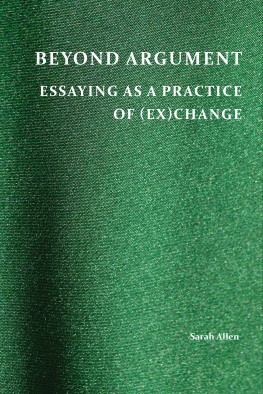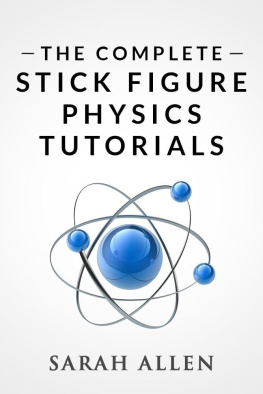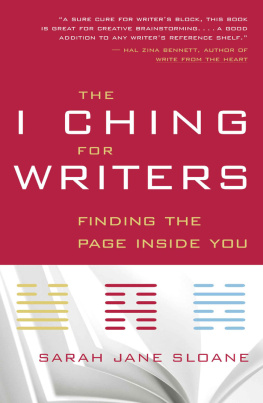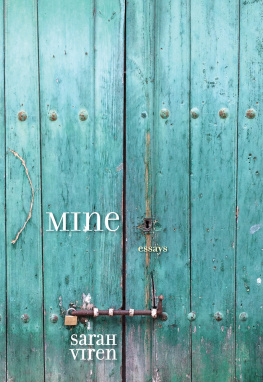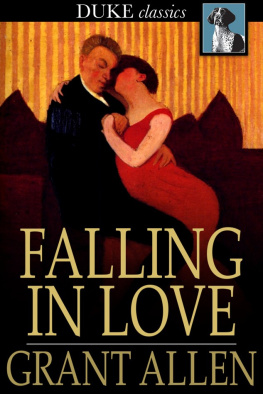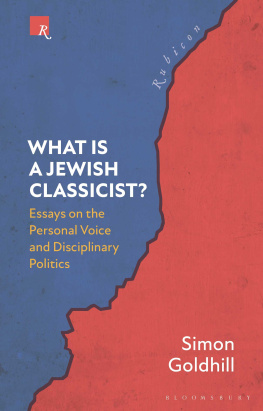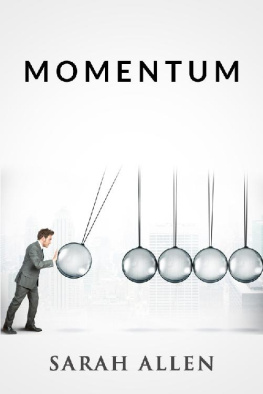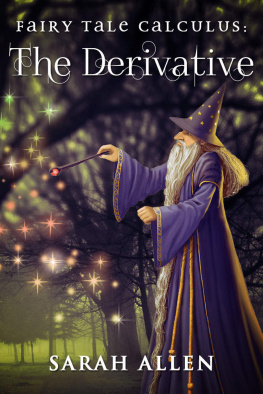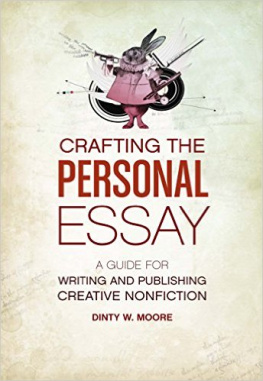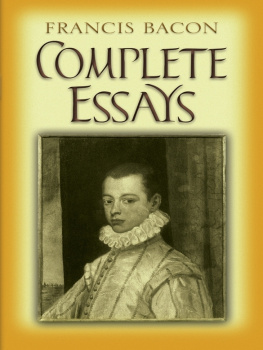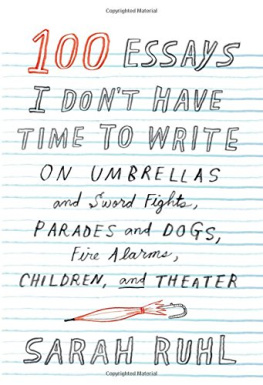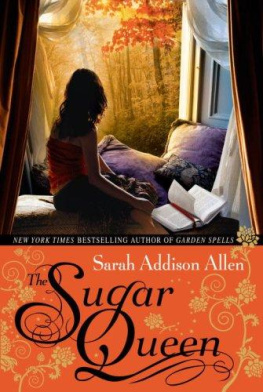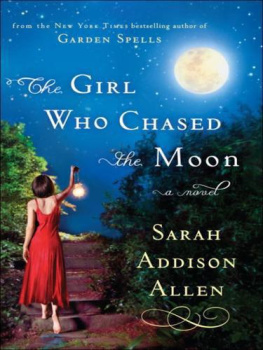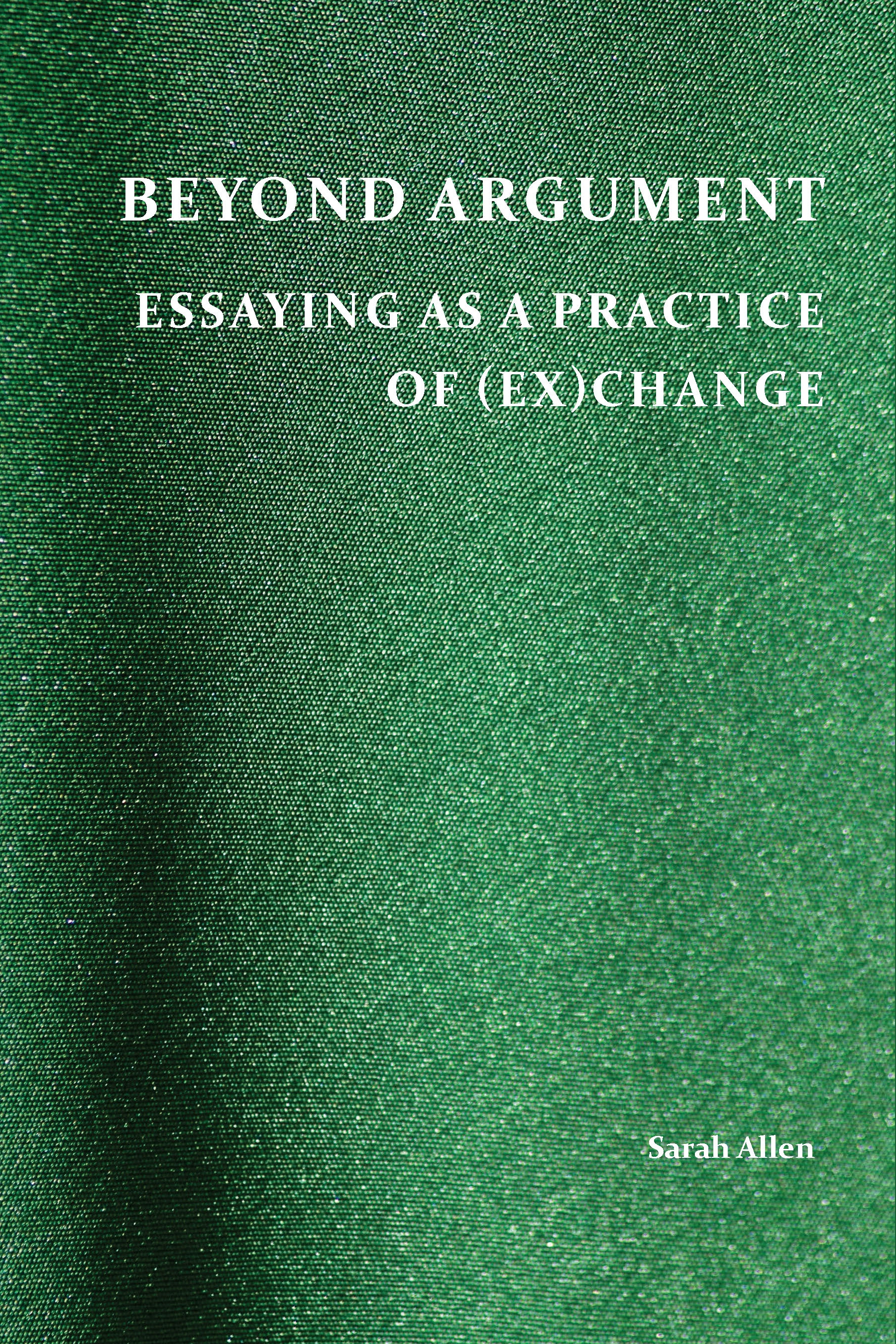Beyond Argument:
Essaying as a Practice of
(Ex)Change
by Sarah Allen
The WAC Clearinghouse
wac.colostate.edu
Fort Collins, Colorado
Parlor Press
www.parlorpress.com
Anderson, South Carolina
PERSPECTIVES ON WRITING
Series Editor, Susan H. McLeod
The Perspectives on Writing series addresses writing studies in a broad sense. Consistent with the wide ranging approaches characteristic of teaching and scholarship in writing across the curriculum, the series presents works that take divergent perspectives on working as a writer, teaching writing, administering writing programs, and studying writing in its various forms.
The WAC Clearinghouse and Parlor Press are collaborating so that these books will be widely available through free digital distribution and low-cost print editions. The publishers and the Series editor are teachers and researchers of writing, committed to the principle that knowledge should freely circulate. We see the opportunities that new technologies have for further democratizing knowledge. And we see that to share the power of writing is to share the means for all to articulate their needs, interest, and learning into the great experiment of literacy.
Recent Books in the Series
Steven J. Corbett, Beyond Dichotomy: Synergizing Writing Center and Classroom Pedagogies (2015)
Christy I. Wenger, Yoga Minds, Writing Bodies: Contemplative Writing Pedagogy (2015)
The Tara Roeder and Roseanne Gatto (Eds.), Critical Expressivism: Theory and Practice in the Composition Classroom (2014)
Terry Myers Zawacki and Michelle Cox (Eds), WAC and Second-Language Writers: Research Towards Linguistically and Culturally Inclusive Programs and Practices , (2014)
Charles Bazerman, A Rhetoric of Literate Action: Literate Action Volume 1 (2013)
Charles Bazerman, A Theory of Literate Action: Literate Action Volume 2 (2013)
Katherine V. Wills and Rich Rice (Eds.), ePortfolio Performance Support Systems: Constructing, Presenting, and Assessing Portfolios (2013)
Mike Duncan and Star Medzerian Vanguri (Eds.), The Centrality of Style (2013)
Chris Thaiss, Gerd Bruer, Paula Carlino, Lisa Ganobcsik-Williams, and Aparna Sinha (Eds.), Writing Programs Worldwide: Profiles of Academic Writing in Many Places (2012)
Andy Kirkpatrick and Zhichang Xu, Chinese Rhetoric and Writing: An Introduction for Language Teachers (2012)
Publication Information
The WAC Clearinghouse, Fort Collins, Colorado 80523-1052
Parlor Press, 3015 Brackenberry Drive, Anderson, South Carolina 29621
2015 by Sarah Allen. This work is licensed under a Creative Commons Attribution-NonCommercial-NoDerivatives 4.0 International.
Printed in the United States of America
Library of Congress Cataloging-in-Publication Data Pending
Copyeditor: Don Donahue
Designer: Mike Palmquist
Series Editor: Susan H. McLeod
The WAC Clearinghouse supports teachers of writing across the disciplines. Hosted by Colorado State University, it brings together scholarly journals and book series as well as resources for teachers who use writing in their courses. This book is available in digital format for free download at http://wac.colostate.edu.
Parlor Press, LLC is an independent publisher of scholarly and trade titles in print and multimedia formats. This book is available in paperback, cloth, and Adobe eBook formats from Parlor Press at http://www.parlorpress.com. For submission information or to find out about Parlor Press publications, write to Parlor Press, 3015 Brackenberry Drive, Anderson, South Carolina 29621, or email editor@parlorpress.com.
Dedication
I dedicate this work to my students.
Contents
Beyond Argument:
Essaying as a Practice of
(Ex)Change
Acknowledgements
I was fortunate enough to have studied with Paul Heilker at Virginia Tech and, then, with Christy Friend, John Muckelbauer, and Pat Gehrke at the University of South Carolina. I am intensely grateful to all of them for their persistent influence on my work. This manuscript, in many ways, is shaped by (and, thus, is only possible because of) their influences. Christy Friend, in particular, continues to serve as a guide and an inspiration for my work not only as a scholar, but also as an administrator and teacher.
I would also like to thank my ever patient and thoughtful colleagues at the University of Northern Colorado, who read early drafts of the manuscript and helped me to revise it with a more diverse audience in mind. Those colleagues include Tracey Sedinger, Molly Desjardins, April Miller, Joseph Chaves, and Kristin Bovaird-Abbo.
Finally, Id like to thank Mom, Liz, and Jason for their patience, support, and grounded perspectives throughout the process of drafting and revising this manuscript. Without them, Im not sure that I could have sustained the work beyond the first chapter.
An earlier version of Chapter 3 was published in Rhetoric Review in 2010 (volume 29, issue 4, pages 364-78), under the title The Cultivated Self: Self Writing, Subjectivity, and Debate. I wish to thank the publisher, Taylor and Francis, for permission to reproduce this material. I am indebted to the reviewers and editors at WAC Clearinghouse and Parlor Press for their invaluable feedback on the manuscript and for their support of this project. I am particularly grateful to Peter Elbow, who served as one of the reviewers, for his generous responses and helpful suggestions at various stages of the projects development.
Introduction
It is no secret that the academy has become obsessed with argument, nor is it a secret that other forms of writing have been demoted to preparatory worktheir unique strengths diminished in the face of the rigors of argument. We college writing teachers and administrators, in particular, have become so focused on argument that we have neglected or at least devalued other exercises. In most college writing curriculum, for example, any exploration is reserved almost exclusively for the preparatory work our students do (e.g., in freewriting, journaling, and class discussion) before completing the more important work of constructing an argument. Even when we talk about Writing Across the Curriculum or Writing in the Disciplines, where there are so many other options for the kinds of writing that could be valued, we writing teachers, scholars, and administrators wave the banner of everythings an argument. This obsession with argument becomes especially problematic when examined in relation to the uses and conceptions of argument at work in forums outside of the academy.
The forms of argument that the American public typically witnesses (e.g., playing out in political arenas and in social media forums) tend to polarize participants by trapping them in a position. Perhaps, in part, this trapping happens because there is simply not enough time in these forums to fully develop a more complex or reflective position, much less to shift a position. Im thinking of the 2008 presidential debates and of the blog posts tacked onto almost any online newspaper article that deals in a contentious topic. Time, however, cannot be the only contributing feature in this trapping. Americans use of argument as an aggressive and competitive mode of engagement is an immeasurable factor.
Today, instead of negotiation and compromise, there are talks of secessions and the creation of new states. Both liberals and conservatives are accused of being compulsively loyal to their respective parties, of lacking critical thinking skills about the issues. We are so divided and intractable that our government shut down in a stand-off that had reverberating, negative effects on our political and economic lives. Unsurprisingly, there is talk about the U.S. people being ungovernable, due to our inability to negotiate and our competitive positioning. Surprisingly, though, Ive seen the same kind of polarization happen among academicsthe people who are supposed to be experts at productive argument (by which I think most of us mean or hope for something more like debate). Think of the ways in which weve inherited the famous Elbow-Bartholomae exchange in College Composition and Communication in the early 90s, for example, or of the latest conflict about writing curriculum that erupted in your department meetings.

